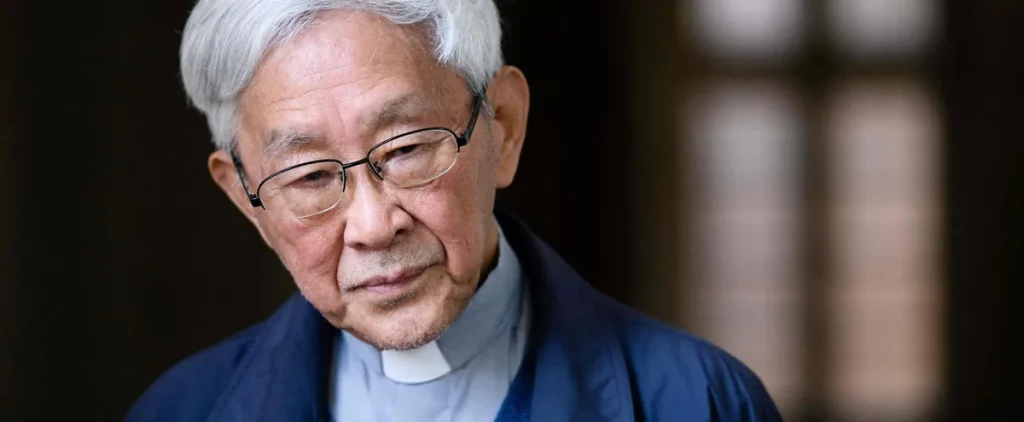China on Thursday justified the arrest of a 90-year-old Catholic cardinal in Hong Kong under its national security law, an act that has sparked international outrage and heightened concern about a worsening crackdown in the financial hub.
One of Asia’s most prominent Catholic clergy, retired Archbishop Joseph Zinn, was among a group of pro-democracy figures arrested Wednesday for “collusion with foreign forces”.
Singer Denise Ho, gay rights activist, lawyer Margaret Ng, academic Hwi Bo Kyung and the latter were also arrested at the airport as he was preparing to leave for Europe where he had secured a university position.
“The individuals involved are suspected of conspiring to collude with foreign countries or foreign forces in order to endanger national security – an act of a serious nature,” the commissioner’s office, which represents the State Department, said in a statement. From Beijing to Hong Kong.
All four were arrested for co-managing a now-dissolved fund, the 612 Humanitarian Relief Fund, which aims to fund the defense of activists arrested during the massive pro-democracy demonstrations that rocked the former British colony in 2019.
Beijing put an end to this massive protest movement and turned Hong Kong, long considered a bastion of free speech, into a region under the growing influence of authoritarian China.
Mr. Zain and the three other figures, who were released on bail Wednesday night, joined more than 180 Hong Kong people arrested in the name of the strict national security law imposed by Beijing in June 2020.
“appalling escalation »
Usually, defendants are not released on bail and can be sentenced to life in prison.
Several Western countries have accused China of wanting to end the freedoms it promised to respect in the territory after the return of the former British colony in 1997.
The United States called on Beijing to “stop targeting those who defend Hong Kong” and the Vatican said it was “following the development of the situation with great interest.”
The Canadian foreign minister described this wave of arrests as “extremely disturbing” and the head of EU diplomacy Josep Borrell expressed his “grave concern”.
Human Rights Watch denounced Hong Kong’s “shocking new decline.”
“Even considering that repression has recently intensified in Hong Kong, these arrests constitute a shocking and appalling escalation,” Amnesty International added.
Cardinal Zen had left Shanghai after the Communists came to power in China in 1949 and became bishop of Hong Kong, where about 400,000 Catholics live.
He had been particularly critical of the compromise reached between the Holy See and Beijing regarding the appointment of bishops in China, and had long been known as a tireless defender of the pro-democracy movement.
In recent years, Hong Kong’s Catholic hierarchy, including Zen’s successors, has been less vocal about Beijing.
“Sword of Damocles
His arrest shocked Hong Kong’s Catholic community, which, unlike the mainland, is free to practice its faith without state control.
“The arrest of Cardinal Zen is a blow to the whole Church in Hong Kong, China and the world,” Italian missionary Franco Milla, 73, who lives in Hong Kong, told AFP.
“It has become clear that there is a sword of Damocles on Zane and the other members of the Church.”
Laura, a public lady visiting a church on Thursday, said worshipers fear Hong Kong will become like China in religious matters.
Ta Kung Pao, a national newspaper affiliated with the Hong Kong Liaison Office in Beijing, published an article on Thursday detailing “six crimes” allegedly committed by the group and its defense fund.
He also reported a donation of 1.3 million Hong Kong dollars (158 thousand euros) from the Apple Daily, a pro-democracy newspaper that was forced to close last year after its assets were frozen on behalf of the Security Act.
Most of the alleged facts mentioned by Ta Kung Pao occurred before the enactment of this law which is not supposed to be retroactive.
The fund was dismantled last year after the National Security Police requested access to information about donors and recipients.

“Total coffee aficionado. Travel buff. Music ninja. Bacon nerd. Beeraholic.”






More Stories
Fluoroscopy | “Self-coup”?
This is why you find it difficult to wake up in the morning.
She meets her boss at the airport after taking sick leave.